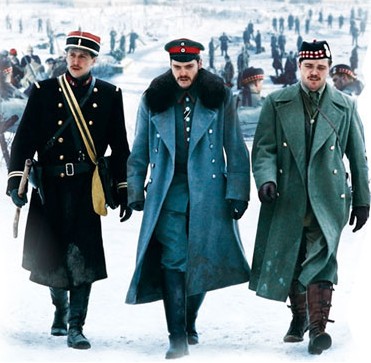

|
Joyeux Noel
10 out of 10 |
 |
|
Pictures
Copyright of Nord-Ouest Productions/Photo JC Lother
A Truly Moving Picture An Oscar for Best Picture should have been a cakewalk for "Joyeux Noel", but sadly, we live in a world filled with corruption and betrayal, famine and war. Don't be fooled by the title! This is no Disney smulch and about the only children you will see throughout are schoolboys spouting the obscene nationalist doctrine, that people of the competing empires are below human. Its a powerful and repulsive corruption of innocence that paints a cruel backdrop to one of the most heartwarming tales of history and not least because it's true. Brought to our screens by a consortium of countries ravanged by World War One, namely Britain, France, Germany, Belgium and Romania it tells the story of how peace and understanding broke out spontainiously in the trenches one Christmas. Unlike other War films, "Joyeux Noel" is not just from one point of view, but simultaneously shows the suffering of characters from the British and French on one side and the Germans on the other and each of their own individual stories. On the German side, they believe that their nation is surrounded by enemies, whilst the British and French see the Kaiser's men as aggressors for invading France and Belgium. At the outset of war in the Summer of 1914, Palmer, a Scottish Anglican priest (Gary Lewis) watches with dismay as two young men excitedly rush to join up. And the reason for their exitement to go to kill? They are bored with their small town lives. As they leave, the candles ominously blow out, as if a reminder of Sir Edward Grey's comment on August 13th 1914: "The lights are going out all over Europe, and we shall not see them lit again in our lifetime." After the initially swift advance by the Germans, through Belgium and Northern France was stopped at the First Battle of the Marne in September, a trench war stalemate resulted. Having joined the men of his parish in France, Palmer finds himself at Neuville St Vaast, a bombed out village where men die like cattle. Worse, he is repremanded even for just trying bravely to climb out the trench to save the life of a Scot, dying yards away from him in "No Man's Land", leaving him disillusioned and disgusted by an army claiming to be trying to save civilization. By Christmas Eve, the popular belief that "it would all be over by Christmas" had become a proven myth, yet still the leadership of the nations were in denial. Heartbroken, but determined Anna Sorensen, a famous Danish opera singer, therefore arranges to sing for the German Kronprinz (Thomas Schmauser), so that she can see Sprink, (Benno Furmann), a corporal that she loves, who is serving in the trenches near the chateau where he is garrisoned. Realising that this might be his last Christmas, she uses her influence to slip away to the front line trenches that evening after their performance together. With Sprink serenading his girlfriend and his compatriot troops in trenches adorned by the little Christmas trees that she had previously sent, it is not long before Palmer joins in with his bagpipes. Soon, the stressed out Lieutenant Audebert, (Guillaume Canet), an artist from Paris who sees mating cockroaches as symbolic of his men's plight, steps forth to join the gathering crowd in "No Man's Land" and a truce is agreed that steadily extends to each of the hundreds of men trying to gain an understanding of each other as Christmas Day breaks forth. Despite all the apparant grief, "Joyeux Noel" is a truly amusing film, both written and directed by Christian Carion. Even at just 5 minutes short of 2 hours, time just flies by with the immense humour of its characters with the cat, the alarm clock, the consignment of Christmas trees and all the little quirks that they have gained in the midst of this hell. In particular there is Horstmayer (Daniel Brühl), the German officer who, as a Jew, ironically can only be a bystander to Christmas, yet, for his efforts, he is ultimately sent to Tannenberg, one of the most savage battles in the freezing snowy wastes of the Eastern Front. Sadly, as we all know, that if he survives, Horstmayer's recompense for his loyalty to his country will ultimately be to die naked in one of Hitler's gas chambers...just as Lieutenant Audebert ends up in front of a firing squad for caring about his men. As the foil to the good will is the grieving, surviving brother from the opening scenes. With his brother dead, his motivation has moved from one of looking greedily for excitement to one of revenge, typifying the underlying cause of this monumental tragedy of mankind. And, indeed, at its end, with Ian Richardson at his nastiest, as a bishop telling troops that it is God's will to kill all Germans, men, women and children, the stage is set for the nightmare that the 20th Century became. Despite being cast with Diane Kruger ( of "National Treasure") as Sorenson and Guillaume Canet as about the only major names amongst a horde of miinor actors, it is played with perfection in a story that is so moving and yet not contrived. It is hard to think of anoither that so conveys the spirit of good will to all men as "Joyeux Noel" does. A True Story of Christmas Goodwill Film Critic: Robert L Thompsett
|
|